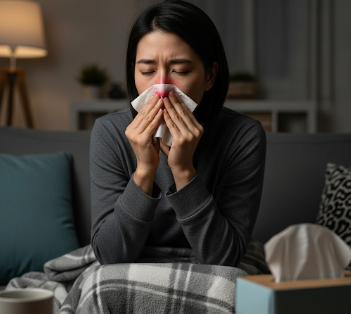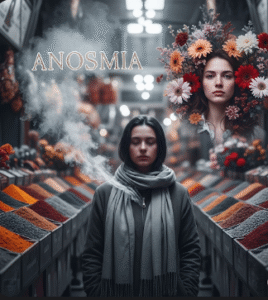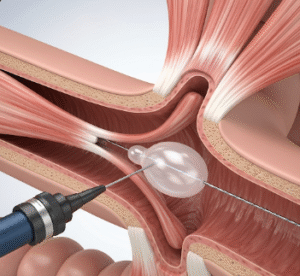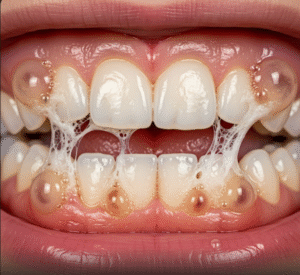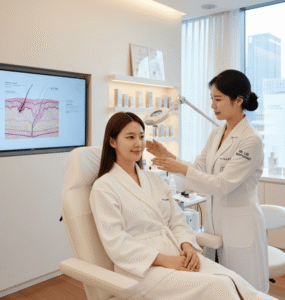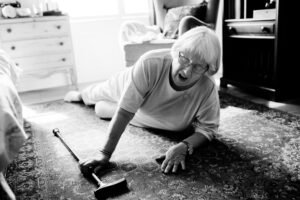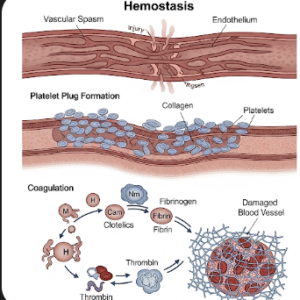Overview
Rhinorrhea, commonly known as a runny nose, occurs when excess mucus drains from the nasal passages. It may be clear, thin, and watery, or sometimes thicker and discolored depending on the underlying cause. Rhinorrhea is a very common symptom that can be temporary, such as from a cold or allergies, or persistent due to chronic conditions like sinusitis.
In Korea, otolaryngologists (ENT specialists) and primary care doctors frequently manage patients with rhinorrhea. Since it may result from a wide range of causes—from minor viral infections to allergic rhinitis or even more serious issues like cerebrospinal fluid (CSF) leaks—it is important to identify the underlying reason for effective treatment.
➤ Very common symptom seen in both children and adults
➤ May be caused by infections, allergies, irritants, or structural nasal issues
➤ Usually self-limiting, but can indicate a serious condition in rare cases
Key Facts
➤ Most often caused by viral infections (common cold)
➤ Allergic rhinitis is a leading cause of chronic rhinorrhea in Korea
➤ Discolored mucus (yellow/green) often suggests infection
➤ Clear, watery discharge after head trauma may suggest CSF leak (urgent)
➤ Can occur alone or with sneezing, congestion, cough, or fever
What is Rhinorrhea (Runny Nose)?
Rhinorrhea refers to the excess production and drainage of mucus from the nose. The mucus acts as a natural defense mechanism, trapping dust, allergens, and pathogens, while keeping nasal passages moist. Excessive drainage may occur when the nose is irritated, inflamed, or infected.
What Symptoms Are Related To
Symptoms often seen along with rhinorrhea include:
➤ Nasal congestion or stuffiness
➤ Sneezing (common in allergies and viral infections)
➤ Itchy, watery eyes (common in allergic rhinitis)
➤ Facial pain or pressure (sinusitis)
➤ Fever, sore throat, cough (viral or bacterial infection)
➤ Clear watery leak after trauma (possible cerebrospinal fluid leak – urgent)
What Causes / Possible Causes
Common causes of rhinorrhea include:
Infections
➤ Viral upper respiratory tract infections (common cold, influenza)
➤ Bacterial sinus infections
Allergies
➤ Seasonal allergic rhinitis (hay fever)
➤ Perennial allergic rhinitis (dust mites, pet dander, mold)
Irritants & Environmental Triggers
➤ Smoke, strong odors, pollution (common in urban Korea)
➤ Cold or dry air exposure
Structural / Other Causes
➤ Nasal polyps
➤ Deviated septum
➤ Cerebrospinal fluid (CSF) leak (rare but serious)
➤ Medications (e.g., overuse of nasal decongestant sprays – rhinitis medicamentosa)
When Should I See My Doctor
Seek medical advice if you experience:
➤ Persistent runny nose lasting >10 days
➤ High fever, severe facial pain, or swelling
➤ Thick, yellow/green discharge with worsening symptoms
➤ Recurrent runny nose linked with allergies or asthma
➤ Clear watery discharge after a head injury (possible CSF leak – emergency)
Care and Treatment
Treatment depends on the underlying cause:
Self-Care / Home Remedies
➤ Stay hydrated and rest
➤ Use saline nasal sprays or rinses (widely available in Korea)
➤ Use a humidifier to moisten dry indoor air
➤ Avoid irritants such as smoke or pollution
Medical Treatments
➤ Antihistamines (for allergy-related rhinorrhea)
➤ Decongestants (short-term relief, avoid prolonged use)
➤ Nasal corticosteroid sprays (for allergic or chronic rhinitis)
➤ Antibiotics (if bacterial sinusitis is confirmed)
➤ Surgery (for nasal polyps, deviated septum, or CSF leaks)
Treatment Options in Korea
Korea has advanced ENT (ear, nose, and throat) medical facilities with specialized diagnostic tools and treatment options for rhinorrhea.
➤ Diagnostic Services
➤ Nasal endoscopy for polyps, sinus infections, or CSF leaks
➤ Allergy testing (skin prick test, IgE blood tests)
➤ Sinus imaging (CT/MRI if needed)
➤ Treatment Approaches
➤ Allergy immunotherapy (desensitization) widely available in Korean hospitals
➤ Endoscopic sinus surgery (ESS) for chronic sinusitis or nasal polyps
➤ Minimally invasive repair for CSF leaks
➤ Top Hospitals for Rhinorrhea & ENT Care in Korea
➤ Seoul National University Hospital – ENT and allergy specialty care
➤ Asan Medical Center – Advanced sinus and allergy treatment
➤ Samsung Medical Center – Minimally invasive endoscopic procedures
➤ Severance Hospital (Yonsei University) – Comprehensive allergy and sinus clinic
Final Thoughts
Rhinorrhea is one of the most common symptoms worldwide, often linked to colds, allergies, or sinus problems. While usually harmless and self-limiting, persistent or unusual cases may signal more serious conditions.
In Korea, patients can benefit from specialized ENT care, advanced allergy testing, immunotherapy, and minimally invasive sinus surgery when necessary.
If your runny nose persists, worsens, or is accompanied by severe symptoms, consulting a doctor ensures proper diagnosis and effective treatment.

